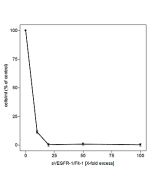Cookie Policy: This site uses cookies to improve your experience. You can find out more about our use of cookies in our Privacy Policy. By continuing to browse this site you agree to our use of cookies.
AdipoGen Life Sciences
VEGF 164 (mouse) (rec.)

| Product Details | |
|---|---|
| Synonyms | Vascular Endothelial Growth Factor; VEGF-A; VPF |
| Product Type | Protein |
| Properties | |
| Source/Host | Sf9 cells |
| Sequence | Mouse VEGF 164 (164aa). |
| Crossreactivity | Mouse |
| Biological Activity | The ED50 for stimulation of cell proliferation by human umbilical vein endothelial cells for VEGF 164 has been determined to be in the range of 1-5ng/ml. |
| MW | ~48kDa |
| Purity | ≥95% (SDS-PAGE) |
| Reconstitution | Reconstitute with 50mM acetic acid to a concentration not lower than 50μg/ml. |
| Formulation | Lyophilized. |
| Other Product Data | UniProt link Q00731: VEGF 164 (mouse) |
| Shipping and Handling | |
| Shipping | BLUE ICE |
| Short Term Storage | +4°C |
| Long Term Storage | -20°C |
| Handling Advice |
After reconstitution, prepare aliquots and store at -20°C. Avoid freeze/thaw cycles. Centrifuge lyophilized vial before opening and reconstitution. For long term storage we recommend to add at least 0.1% human or bovine serum albumin. |
| Use/Stability | Stable for at least 6 months after receipt when stored at -20°C. |
| Documents | |
| MSDS |
 Download PDF Download PDF |
| Product Specification Sheet | |
| Datasheet |
 Download PDF Download PDF |
Mouse vascular endothelial growth factor 164 (VEGF 164) is produced as a homodimer. It binds to the FLT1/VEGFR1 and KDR/VEGFR2 receptors, heparan sulfate and heparin. It is a specific mitogen for vascular endothelial cells and a strong angiogenic factor in vivo. In addition to its action as a mitogen it is a potent vascular permeability factor (VPF) in vivo and is also a chemoattractant for monocytes and endothelial cells. It induces endothelial cell proliferation, promotes cell migration, inhibits apoptosis and induces permeabilization of blood vessels. It may play a role in increasing vascular permeability during lactation, when increased transport of molecules from the blood is required for efficient milk protein synthesis.
Bevacizumab as a potent inhibitor of inflammatory corneal angiogenesis and lymphangiogenesis: F. Bock, et al.; Invest. Ophthalmol. Vis. Sci. 48 2545 (2007)







